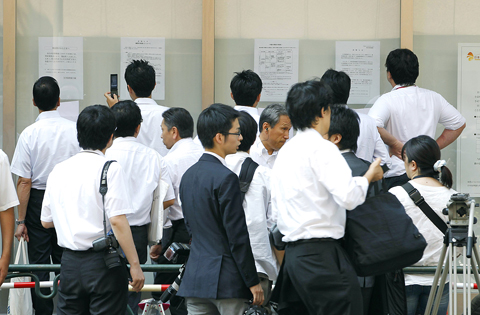The Japanese economy isn’t quite as weak as first thought, but it still needs help, the government said yesterday as it unveiled details of a new US$11 billion stimulus package.
Revised figures showed that GDP expanded at an annualized rate of 1.5 percent in the April-June period, an improvement on the meager 0.4 percent reported in last month’s preliminary report.
The latest numbers, which put Japan on par with US growth rates, are better but not great. Growth has fallen sharply since the 5 percent annualized rate recorded in the first quarter, and the future looks increasingly murky.

PHOTO: REUTERS
It was at least enough to buoy investor sentiment for the day.
The Nikkei 225 stock average led regional gains, finishing up 140.78 points, or 1.6 percent, at 9,239.17. The improved growth figure stemmed from higher capital spending by companies. Corporate investment expanded 1.5 percent, compared with 0.5 percent growth in the Cabinet Office’s preliminary figures.
The government, however, moved quickly to announce its latest plan to fend off worrying headwinds. Japanese Prime Minister Naoto Kan’s Cabinet approved ¥915 billion (US$10.9 billion) in new stimulus measures. The previously announced package aims to boost domestic consumption, fight deflation and tackle fallout from a strong yen, which hit a new 15-year high this week.
A strong yen is painful for the country’s vital exporters because it reduces the value of repatriated profits and makes their products less competitive overseas. Toyota Motor Corp has said that every ¥1 climb versus the dollar saps ¥30 billion from operating profit.
The fresh injection sets Japan apart from the rest of the developed world, which is winding down stimulus spending even amid signs of a cooling global economy. Since Kan revealed his plans last month, the package has been criticized by analysts as too little to make any meaningful impact.
The government says the package will lead to 200,000 new jobs and raise GDP by about 0.3 percent.
About half of the money will go toward extending consumer subsidy programs for energy-efficient homes and appliances. Other measures include job support programs for new graduates and steps to convince companies to keep jobs in Japan instead of moving factories overseas because of the strong yen.
“The direction, rather than the size of package, is extremely important,” Japanese Chief Cabinet Secretary Yoshito Sengoku said, according to Kyodo news agency.
The government said it would “continue to monitor movements and adopt decisive measures when necessary. It also expressed hope that the central bank would work with the government to enact additional policy measures if needed.
Hamstrung by massive debt, the government will not issue new bonds to fund the emergency measures. It will instead tap into a reserve fund in this year’s budget.
Meanwhile, the private Incubator Bank of Japan (IBJ) has been ordered to halt operations and was to file for bankruptcy yesterday, in what would be Japan’s first bank failure in seven years, officials said.
Government officials said the bankruptcy would have little impact on the Japanese financial system, however.
The Financial Services Agency has told the bank it cannot do any business for at least three days and must make efforts to protect existing depositors, the agency said in a statement.
The Nikkei Shimbun and other Japanese media said the agency was likely to let the bank go under and would only refund depositors a maximum of ¥10 million. This would be the first time that a cap on deposit insurance had been used in Japan.
The Tokyo-based bank may report a negative net worth of ¥180 billion, the public broadcaster NHK and Jiji Press reported, without citing sources.
Japanese Financial Services Minister Shozaburo Jimi said in a statement that the IBJ was to file for bankruptcy yesterday at the Tokyo District Court.
“It’s extremely regrettable that the situation occurred. I hope depositors remain cool-headed as up to ¥10 million in deposits will be protected,” he said.
It would be the first bankruptcy in Japan’s banking sector since 2003. However, Bank of Japan Governor Masaaki Shirakawa issued a statement saying the failure of IBJ does not pose a threat and would not have “an adverse impact on the stability of Japan’s financial system.”

Nvidia Corp yesterday unveiled its new high-speed interconnect technology, NVLink Fusion, with Taiwanese application-specific IC (ASIC) designers Alchip Technologies Ltd (世芯) and MediaTek Inc (聯發科) among the first to adopt the technology to help build semi-custom artificial intelligence (AI) infrastructure for hyperscalers. Nvidia has opened its technology to outside users, as hyperscalers and cloud service providers are building their own cost-effective AI chips, or accelerators, used in AI servers by leveraging ASIC firms’ designing capabilities to reduce their dependence on Nvidia. Previously, NVLink technology was only available for Nvidia’s own AI platform. “NVLink Fusion opens Nvidia’s AI platform and rich ecosystem for

WARNING: From Jan. 1 last year to the end of last month, 89 Taiwanese have gone missing or been detained in China, the MAC said, urging people to carefully consider travel to China Lax enforcement had made virtually moot regulations banning civil servants from making unauthorized visits to China, the Control Yuan said yesterday. Several agencies allowed personnel to travel to China after they submitted explanations for the trip written using artificial intelligence or provided no reason at all, the Control Yuan said in a statement, following an investigation headed by Control Yuan member Lin Wen-cheng (林文程). The probe identified 318 civil servants who traveled to China without permission in the past 10 years, but the true number could be close to 1,000, the Control Yuan said. The public employees investigated were not engaged in national

ALL TOGETHER: Only by including Taiwan can the WHA fully exemplify its commitment to ‘One World for Health,’ the representative offices of eight nations in Taiwan said The representative offices in Taiwan of eight nations yesterday issued a joint statement reiterating their support for Taiwan’s meaningful engagement with the WHO and for Taipei’s participation as an observer at the World Health Assembly (WHA). The joint statement came as Taiwan has not received an invitation to this year’s WHA, which started yesterday and runs until Tuesday next week. This year’s meeting of the decisionmaking body of the WHO in Geneva, Switzerland, would be the ninth consecutive year Taiwan has been excluded. The eight offices, which reaffirmed their support for Taiwan, are the British Office Taipei, the Australian Office Taipei, the

DANGEROUS DRIVERS: The proposal follows a fatal incident on Monday involving a 78-year-old driver, which killed three people and injured 12 The Ministry of Transportation and Communications yesterday said it would lower the age for elderly drivers to renew their license from 75 to 70 as part of efforts to address safety issues caused by senior motorists. The new policy was proposed in light of a deadly incident on Monday in New Taipei City’s Sansia District (三峽), in which a 78-year-old motorist surnamed Yu (余) sped through a school zone, killing three people and injuring 12. Last night, another driver sped down a street in Tainan’s Yuching District (玉井), killing one pedestrian and injuring two. The incidents have sparked public discussion over whether seniors